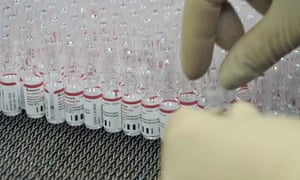Initiative aims to ensure low-income countries are not frozen out by rich nations

The World Bank has announced plans for a $12bn (£9.3bn) initiative that will allow poor countries to purchase Covid-19 vaccines to treat up to 2 billion people as soon as effective drugs become available.
In an attempt to ensure that low-income countries are not frozen out by wealthy nations, the organisation is asking its key rich-nation shareholders to back a scheme that will disburse cash over the next 12 to 18 months.
David Malpass, the World Bank president, said the initiative was needed because Covid-19 was having a much bigger impact on low and middle income countries than on the developed world.
“Having this finance available will be a game changer because once a safe and effective vaccine is available it will allow people to resume their lives with confidence.”
He said the initiative would build on the Covid-19 emergency programmes announced when the crisis began in the spring and that countries could either buy vaccines themselves, act together with other countries or take advantage of procurement mechanisms.
The plan is subject to approval by the World Bank’s shareholders but Malpass said he was optimistic they would agree.
The Bank has run successful vaccination campaigns in the past for polio, measles and HIV/Aids, and will encourage countries to make a priority of health workers and vulnerable groups. Malpass said: “Many countries will want to use this money.”
To support deployment, the Bank is already undertaking assessments of country health systems to identify gaps and areas for possible investment as part of its overall approach to tackling Covid-19.

